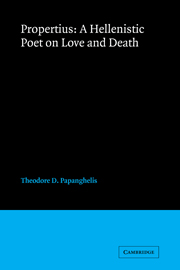Book contents
- Frontmatter
- Contents
- Preface
- Abbreviations
- 1 Introductory
- 2 nostris puer haesit ocellis: the lessons of 1.19
- 3 in amore mori: witches and lovers
- 4 in amore mori: the funeral
- 5 in amore mori: the shipwreck
- 6 in amore mori: crime passionnel
- 7 in amore mori: minor instances in Book 2
- 8 Strange beauty: a reading of 4.7
- 9 Concluding thoughts
- Bibliography
- Indexes
8 - Strange beauty: a reading of 4.7
Published online by Cambridge University Press: 04 August 2010
- Frontmatter
- Contents
- Preface
- Abbreviations
- 1 Introductory
- 2 nostris puer haesit ocellis: the lessons of 1.19
- 3 in amore mori: witches and lovers
- 4 in amore mori: the funeral
- 5 in amore mori: the shipwreck
- 6 in amore mori: crime passionnel
- 7 in amore mori: minor instances in Book 2
- 8 Strange beauty: a reading of 4.7
- 9 Concluding thoughts
- Bibliography
- Indexes
Summary
‘Of all melancholy topics, what, according to the universal understanding of mankind, is the most melancholy?’ Death – was the obvious reply. ‘And when’, I said, ‘is this most melancholy of topics most poetical?’ From what I have already explained at some length, the answer, here also, is obvious – ‘ When it most closely allies itself to Beauty: the death, then, of a beautiful woman is, unquestionably, the most poetical topic in the world – and equally is it beyond doubt that the lips best suited for such topic are those of a bereaved lover.’
Edgar Allan Poe, The philosophy of compositionWe have been introduced in recent years to the various strands out of which the opulent tapestry of 4.7 is woven; indeed, ‘epic, tragedy, the mime, the epigram have all been turned to account’. Remarkable as this may be, it should give little cause for surprise; we now have a better understanding of the debt of Roman elegy to various generic sources. The real challenge 4.7 poses for the reader is the interaction within its compass of different styles and tonal levels. Opinions generally converge in the process of identifying the poem's ingredients and diverge when it comes to assessing its overall tone. It is rather ironical that the lush Bildungserlebnis in this poem should have failed to warn against the fabrication of further Urerlebnis-items: if 3.24 and 25 dismiss Cynthia, as they profess to do, the hatchet must have been buried somewhere between those poems and 4.7; Cynthia died after reconciliation and was summarily consigned to her grave to re-emerge from it as a chiding apparition on the night following her obsequies.
- Type
- Chapter
- Information
- Propertius: A Hellenistic Poet on Love and Death , pp. 145 - 198Publisher: Cambridge University PressPrint publication year: 1987



